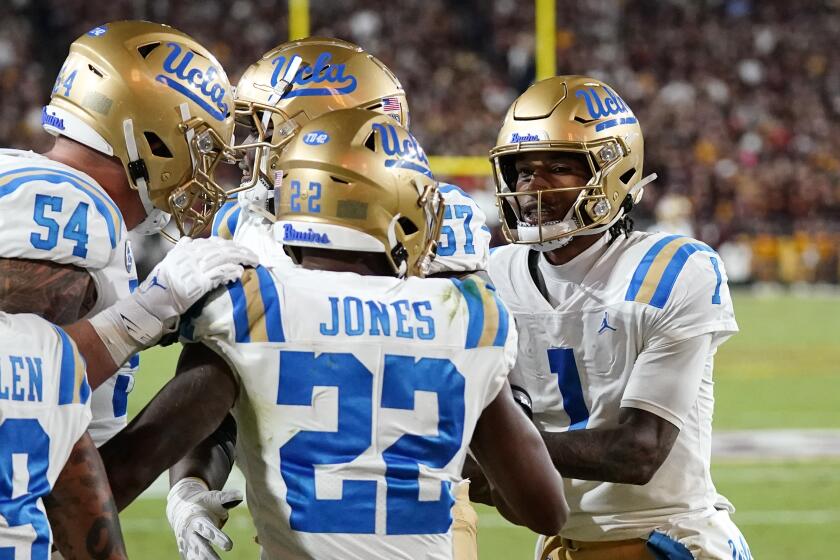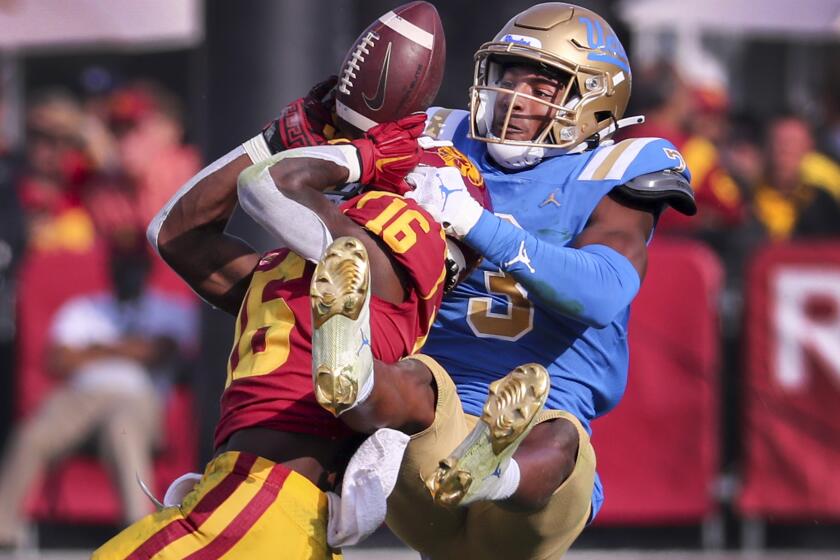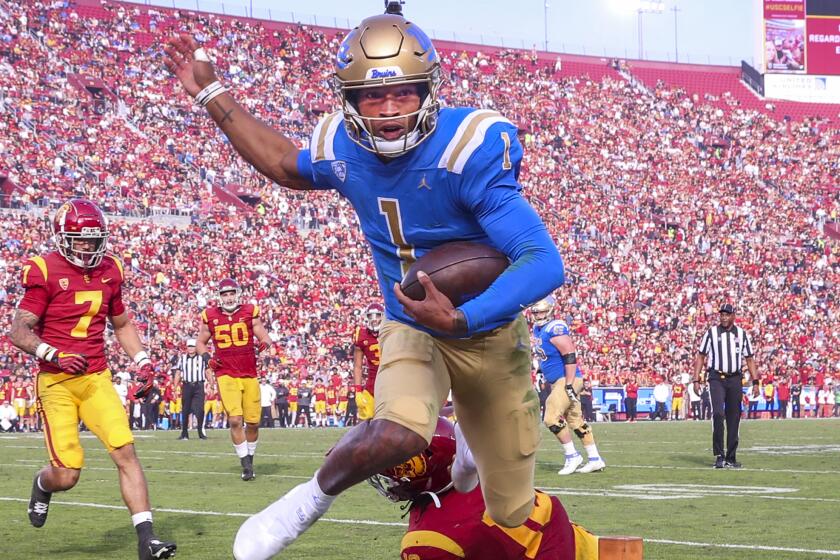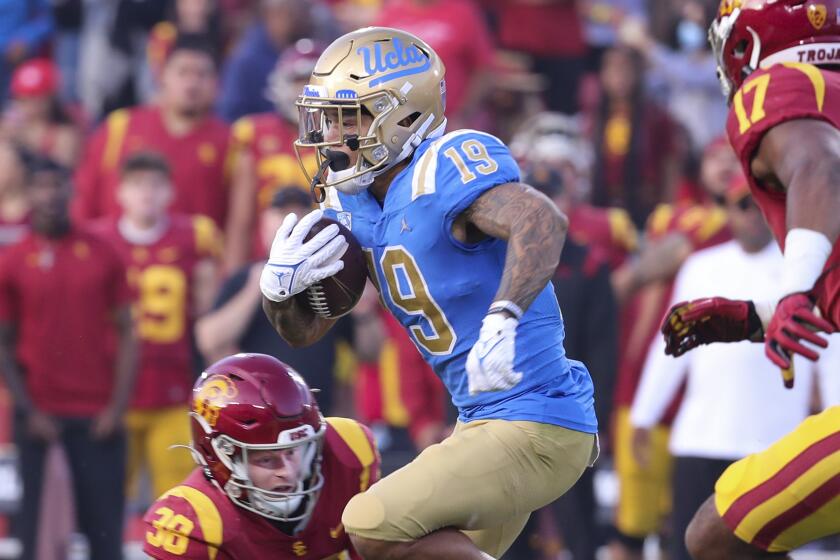UC regents delay final decision on UCLA’s Big Ten move until December
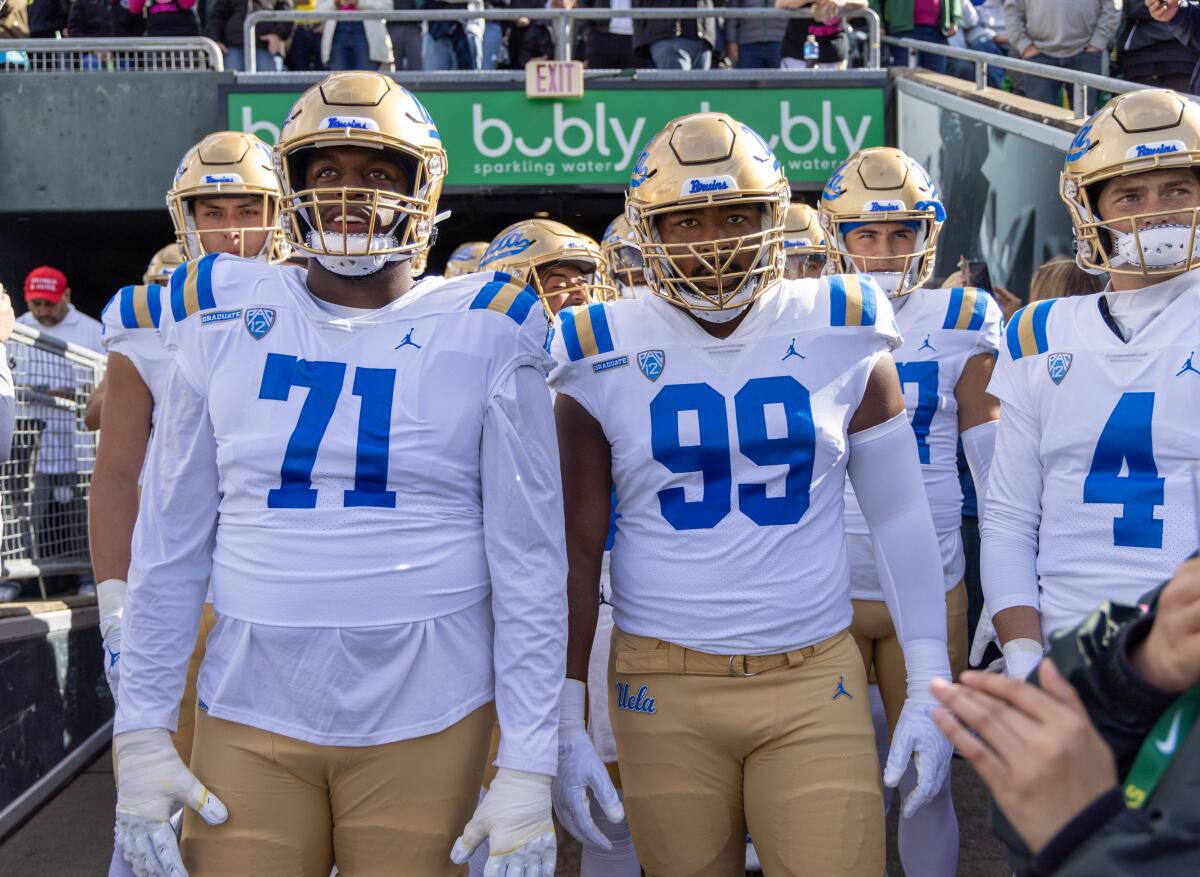
- Share via
Despite UCLA’s push for clarity, the University of California Board of Regents declined Thursday to settle questions surrounding the Bruins’ move to the Big Ten and instead plans to finalize a decision at a Dec. 14 special meeting.
UCLA officials were pushing for a decision with football signing day next month and looming logistical issues they need to resolve well in advance of the Bruins’ potentially playing their first games as members of the Big Ten in 2024.
At a board meeting Thursday in San Francisco, chancellors from UCLA and UC Berkeley offered different views on whether the move would hurt or help athletes. Berkeley, the only UC school left in the Pac-12 conference with UCLA’s departure, stands to lose millions in media revenue under a new TV contract in two years, which is expected to be far less lucrative without USC and UCLA and the huge Southern California market.
University of California regents could vote Thursday on whether to block UCLA’s move to the Big Ten.
Several regents — including Gov. Gavin Newsom, an ex-officio board member — have expressed concern over the potentially negative effect on Berkeley and UC athletes.
UC Berkeley Chancellor Carol Christ told regents that she decries changes during this “extraordinarily volatile time” in college athletics, including more emphasis on “pay to play” and increased professionalization of revenue-generating sports, such as football and basketball. She said she had come to believe that having more conferences rather than a consolidation of a few powerful ones was in the better interest of all students, particularly women athletes.
UCLA Chancellor Gene Block said the decision to leave the Pac-12 for the Big Ten was complex and painful but ultimately campus officials believed it would benefit athletes through opportunities to raise more revenue, gain wider national exposure and provide stronger athletic competition.
“The student athletes have been excited about the opportunity to compete with the best teams,” he said. “In the end, we decided this was the best move for UCLA.”
University of California system leaders proposed new rules that may limit campuses from making major athletics contract decisions on their own.
Block told regents that the school plans spend at least $10 million more to provide enhanced nutrition, travel, academic support and mental health services for its athletes, helping offset the increased travel associated with competing in a coast-to-coast conference.
The biggest expenditure related to conference realignment would involve increased travel costs. UCLA estimated that it would have to pay an extra $4.62 million to $5.79 million for additional charter flights, though that figure could be “significantly reduced” through scheduling accommodations such as neutral-site games and shared flights for UCLA and USC teams.
UCLA also has allocated $2.927 million to enhance nutritional support, providing breakfast and lunch on weekdays for all teams while expanding snack options throughout the day and adding two dieticians and 10 part-time student workers to staff a snack station.
Additionally, the school would pay $1.036 million to double the number of learning specialists from three to six, increase full-time “academic excellence” staff to 22 and expand its summer bridge program from 30 to 100 students, allowing half of all new athletes to enroll in summer school while adjusting to their curriculum. UCLA would also provide a $500 stipend to all athletes to purchase Wi-Fi, hot spots, headphones and other accessories related to remote learning.
USC and UCLA are leaving the Pac-12 for the Big Ten Conference in 2024, the two schools announced Thursday.
Finally, UCLA would provide $562,800 for two new licensed therapists to join the staff of 3.5 mental health service providers, reducing wait times for appointments and providing enhanced care, while also allocating $252,000 for education, preventive measures and direct psychiatric care to help with sleep, eating disorders, substance abuse and other acute conditions.
UCLA officials say the roughly eight-figure outlay for enhanced student support will be more than offset by additional revenue that comes from joining the Big Ten.
The school is projected to make between $65 million and $75 million in media rights revenue alone during its first year of conference membership, with additional income flowing in from College Football Playoff and NCAA tournament distributions that would likely dwarf what the Bruins would make by remaining in the Pac-12. That should more than double the $34.3 million UCLA made from its Pac-12 media rights and conference distributions in the fiscal year 2020, the last year for which figures are available before COVID-19 walloped athletic department finances across the country.
The conference switch also would prevent UCLA from eliminating Olympic sports teams, something the school said was a possibility given its $102.8-million athletic department deficit. UCLA told the regents that by cutting six teams and eliminating scholarships for eight other sports, it could save about $11 million.
The Big Ten’s new TV agreement with Fox, CBS and NBC is worth nearly $8 billion. It will liberate USC and UCLA from after-dark kickoffs.
According to a joint survey of 111 Bruins athletes conducted by UCLA and the UC Office of the President, 93% said it was important or very important to keep UCLA in the same conference as USC, while 24% of Bruins athletes said keeping UCLA and sister school California in the same conference met the same level of importance.
The survey showed there is no overwhelming opposition to the move, as suggested recently by Pac-12 Commissioner George Kliavkoff. Asked about their school going to the Big Ten, 35% of the survey respondents said it would be a good idea, 20% said they had no opinion, 38% said they would need more information and 7% said it would be a bad idea.
The regents have conceded that UCLA rightfully used its delegated authority to agree to join the Big Ten. But they said they retained the right to affirm, overturn or abstain from acting on that decision — which they plan to wield next month.
More to Read
Sign up for Essential California
The most important California stories and recommendations in your inbox every morning.
You may occasionally receive promotional content from the Los Angeles Times.
